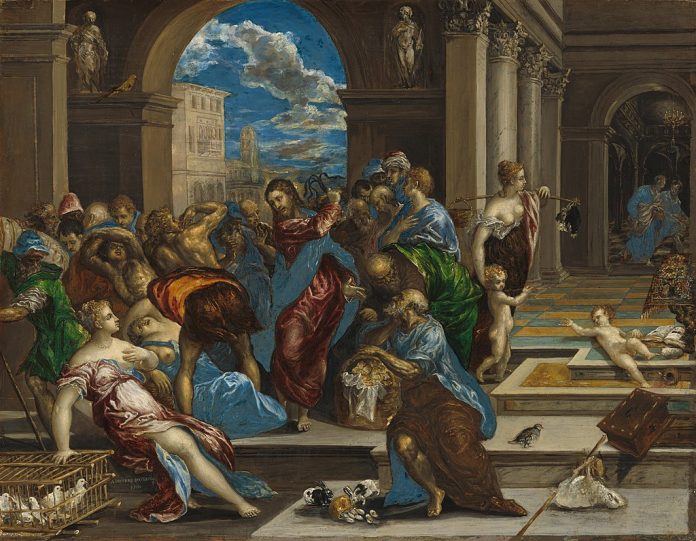The Gospel for this third Sunday of Lent, John 2:13-25, shows a side of Jesus we do not often get to see. Witnessing the abuse of the sacred space that was the temple in Jerusalem, his righteous indignation is aroused. He fashions a whip and uses it to clear out offenders, flips tables, and while it does not say that He did, I can imagine that He rebuked them with a tone that was harsh, and that He did not hesitate to raise His voice. Jesus, the God-man, saw a perversion of justice and took corrective matters into His own hands. How often we are tempted to do the same.
I was recently made to experience an exercise that was billed as a talk on biases in leadership. We participants were given a scenario in which there were several actors, one of whom is killed, and then we were asked to assign levels of responsibility for the killing on all of the actors, including the one who had met their unfortunate demise. As individuals we ranked them, split into random groups we were made to discuss and agree on a group ranking, then as a room we presented and discussed our group ranking and how we got there. So far, so good.
Then, the presenter revealed that the players in the scenario were symbols of racial groups, and that the exercise was drawn from a book published in 1978 that championed anti-racism and that one of the main antagonists in the scenario was metaphorically representative of white privilege. The victim of the killing was representative of minorities and marginalized groups. These revelations drew numerous approving responses, and then the wheels on the cart started to wobble when a member of the former group objected.
A couple of straight, white, Christian males spoke up and made their disagreement with this characterization known, drawing almost an hour of conversation that was geared at dismissing their points. In the end, a book on white fragility was recommended for further reading. The problem was still with the straight, white, Christian male and his unassailable grip on society. None of this was violent, and the tone was collegial in large measure, but underlying all of it is the notion of “othering” a group of people based on the immutable characteristics of race and gender (yes, gender is immutable, but I’ll save that for another time). You may have guessed it, but to be clear, I was one of the men who objected. I have not been able to let this experience settle, and I disagree that it is because I am fragile. I believe it is a righteous indignation.
So back to today’s Gospel. Using the words of the euphemism “what would Jesus do” to assess how I might deal with my own feelings on this, I am encouraged, but still not at peace. Seeing an injustice, Jesus responded to correct it forcefully. That is His job, and that kind of judgment and justice is His to dispense. As much as I wanted to push back and resist at this event, nothing seemed to have changed. My wish to flip tables and rebuke got me nowhere. And that is the place from which I sat to write this, wondering how to proceed.
I will proceed from the end of this Gospel. Jesus “did not need anyone to testify to Him about human nature. He Himself understood it well”. Jesus loves us, and is one of us. He is here and real and wants to be our consolation. He, and He alone, can put all things right. I will keep my trust in Him.










